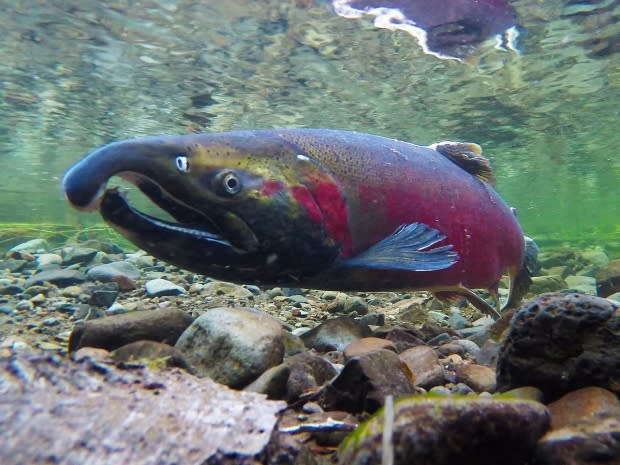CO2 may rob salmon of their sense of smell, new study says
A new study out of the University of Washington and NOAA Fisheries' Northwest Fisheries Science Centre shows rising carbon dioxide in the ocean may be impacting how salmon perceive scents.
"Their sense of smell is very important in their whole life," said Chase Williams, the lead author of the study published in Global Change Biology Monday.
Salmon depend on their nose to avoid predators, find food, attract a mate and make their way back upstream to where they were hatched in order to spawn and die.
"Understanding how potential chemistry changes in the ocean would affect that sensory function for them is definitely an important question to answer," said Williams.
The study looked a coho salmon, also known as silver salmon, that are found in the Alsek-Tatshenshini River system in Yukon, and farther north in the Porcupine River system.
The ocean absorbs carbon dioxide from the air, which concentrates the it in the water, lowering the pH. This is the process of ocean acidification.
The research team looked at juvenile coho salmon in three different tanks with different pH levels. The first tank had the current pH level from the water in Puget Sound, while the other tanks had the predicted pH levels for the next 50 and 100 years.
There is definitely enough evidence that it is worrisome. - Chase Williams
The fish were in the tanks for two weeks before they were exposed to the smell of salmon skin extract, used to trigger the response of a predator attack.
The fish in the water with the current CO2 levels responded by swimming away from the smell, but the fish in the other two tanks did not.
"It's actually ... altering the way their brain actually processes the signals they are picking up," said Williams.
The fish could still smell the odours but no longer processed them as something dangerous.
Williams said he doesn't know if this will affect their ability to find their way to their spawning grounds, but there is enough evidence to show it is possible.
"There is definitely enough evidence that it is worrisome," said Williams.

Williams says the way neurons talk to each other in other species of salmon are the same as the coho, meaning there is a good evidence that the same response could occur in other species. This is something Williams and his team are interested in looking at in the future.
"Pacific Northwest salmon are such a huge part of the ecosystem they're also hugely important culturally and economically," said Williams.
Increasing ocean acidification can contribute to other stressors in salmon environments, putting the species at greater risk, according to Williams.
"It just shows that increasing atmospheric CO2 and the corresponding increase in CO2 concentrations in the oceans are having wider ramifications then we initially understood," said Williams.

